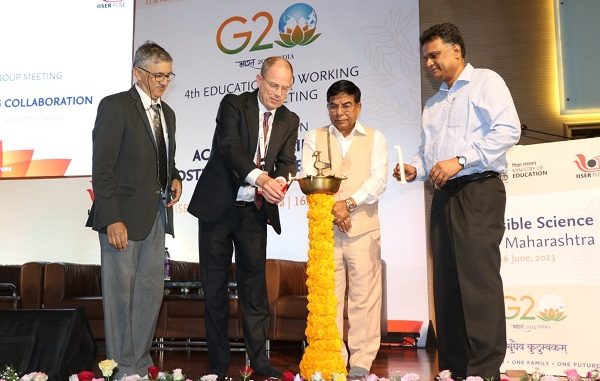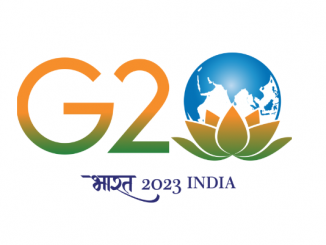
Jun 17: The precursor events of the 4th G20 Education Working Group Meeting and G20 Education Ministers Meeting kick-started in Pune today, with a seminar on “Accessible Science: Fostering Collaboration” organized at the Indian Institute of Science Education and Research in collaboration with ELSEVIER.
The seminar was inaugurated by the Union Minister of State for Education Dr Subhas Sarkar and saw participation from Secretary of Higher Education Shri K Sanjay Murthy Shri Sunil S Bhagwat, Director, IISER Pune, Dr Nick Fowler, Chair of The International Association of STM Publishers, and Chief Academic Officer, Elsevier, Mr Carlos Henrique de Brito Cruz, SVP, Research Networks, Elsevier, Professor Emeritus, of Campinas, Unicamp, Brazil and many more dignitaries who engaged in fruitful discussions on best practices for accessible science in global development and provided a clear vision for G-20 countries to follow.
MoS (Education) Dr Subhas Sarkar also launched a report titled “The status and relevance of research collaborations for development, considering G20 nations” on the occasion.
Speaking at the inaugural session, Dr. Subhas Sarkar, emphasised the importance of removing barriers to knowledge, promoting transparency, and fostering multidisciplinary collaborations. MoS (Education) cited several ‘accessible science’ initiatives of the Government of India, such as the Vaccine Maitri, Genome India Project, BHUVAN by the Indian Space Research Organisation, e-Shodhganga, SWAYAM, and SWAYAM-NPTEL platforms, as examples of successful collaborative efforts that have led to meaningful change and sustainable development. He further emphasized the potential for collaborative efforts to explore multidimensional aspects of Indian Knowledge Systems, including Ganita and Jyamiti (Indian system of Mathematics and Geometry) and Vastu Vidya (Indian System of Architecture).
Nick Fowler, Chief Academic Officer at Elsevier, cited India’s stellar performance and remarkable achievements in scientific research. He noted that India’s scholarly output has been steadily increasing. India is the 3rd largest producer of scientific research, overtaking the UK in 2022. But India has not only succeeded in the volume of research output, it also boasts achievements in academic quality. Field Weighted Citation Impact has jumped up from 0.85 in 2019 to 1.05 in 2021, putting India above the global average for publication citations. Mr Nick also appreciated the Indian government’s focus on driving qualitative research to strengthen the country’s competitiveness in global research and innovation, resulting in India climbing to the 40th rank in WIPO’s Global Innovation Index 2022.
Report highlights were also presented by Carlos Henrique de Brito Cruz, Senior VP, Elsevier. He noted India’s surge in the global scientific community. He mentioned in his presentation that India is bound to become to be the 2nd largest publisher in AI-related topics with the oldest AI article with Indian authors dating back to August 1968.
While thanking IISER, Pune and ELSEVIER for organising the event, Secretary, of the Department of Higher Education, Government of India, K. Sanjay Murthy said that NEP 2020 speaks about reaching out to institutions within and outside the country to improve our research output. He expressed hope that the discussions and report launched today will lead to avenues and knowledge on how to further research collaboration and enhance the regulatory framework to provide solutions to global challenges.
The seminar is part of the ongoing 4th and final Education Working Group (EDWG) meeting in Pune, Maharashtra, and taking place from June 19th to 21st, 2023. The overarching theme of the meeting is “Ensuring Foundation Literacy and Numeracy, especially in the context of blended learning.” The EDWG meeting comprises various precursor events, seminars, exhibitions, and heritage excursions, and will culminate with the Education Ministerial meeting on June 22nd, 2023. In the course of the 4th Education Working Group meeting, attendees will engage in dynamic seminars and enriching workshops, painting a vision of innovation in education.


